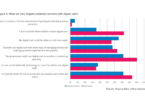The European Central Bank (ECB) has shared its direction for exploring wholesale central bank digital currency (wholesale CBDC) following the first meeting of the “New Technologies for Wholesale settlement Contact Group.” Exploratory work will start in 2024, and the ECB is considering a broad array of options to enable settlement of DLT transactions beyond a simple wholesale CBDC or trigger payment solution.
Variety of DLT settlement options explored
At a high level the ECB outlined four potential pathways. The first two are those commonly considered: connecting to a conventional central bank payment system versus a standalone wholesale CBDC solution which is interoperable with market DLT networks.
It additionally outlined an “integration” approach with the Eurosystem creating a T2S (Target 2 Securities) DLT network for securities settlement. Another “distribution” option is for a wholesale CBDC issued onto DLTs shared with market participants.
However, the first round of experiments will focus on the interoperable approaches as expected. Initially there will be three sets of work based on trials and designs previously outlined by the central banks of Germany, Italy and France.
The Banque de France has focused on an interoperable wholesale CBDC that is DLT-based. Germany and Italy have proposed linking to conventional payment systems in different ways. Germany’s is referred to as a ‘trigger’ solution and Bank of Italy’s as the TIPS Hash-Link solution as outlined in a meeting presentation.
Wholesale CBDC for securities settlement in demand
The meeting minutes included survey results for the 29 market participants around their interest in DLT settlement. Twenty-seven participants (93%) ranked their interest in securities delivery versus payment (DvP) as significant (a score of four or five on a scale of five).
FX Payment versus Payment (PvP) came second, with 16 people (55%) expressing a significant interest, and eight participants (28%) were somewhat interested (a score of three). Only two participants had an interest in other applications.
While it was expected experiments might start this year, the primary reason for deferring until 2024 appears to come from market participants who say their budget and resource allocations are already committed for 2023.
The ECB work will include trials using real central bank money, as well as pure experiments.
Other market players beyond the working group members will be canvassed and invited to participate. However, the rules regarding who has access to central bank money are unchanged.
We’d note that during trials in Canada several years ago, the issue of brokers who are unable to use central bank money undermined some of the benefits. As we wrote at the time:
Brokers are not members of the payments system. So to enable access to cash on-ledger, brokers received credit from a credit extender, which is how it works in the current system. But using this conventional process re-introduced credit risk, thereby undermining one of the significant benefits.






